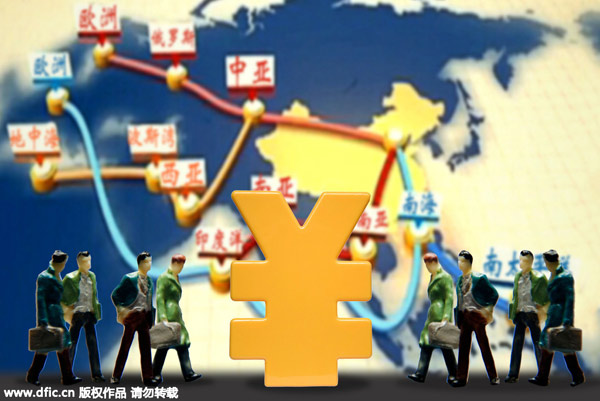
28 May, 2015
China to invest $900b in Belt and Road Initiative
Beijing, (chinadaily.com.cn) 2015-05-28 – China has announced plans to boost the Belt and Road trade by creating economic corridors and investing nearly $900 billion in countries along the route. Vice-Premier Zhang Gaoli said the country is mulling six economic corridors with countries along the Belt and Road trade route to better connect Asia and Europe with funding from the Asian Infrastructure Investment Bank and the Silk Road Fund.
 |
Corridors are set to run through China-Mongolia-Russia, New Eurasian Land Bridge, China-Central and West Asia, Indo-China Peninsula, China-Brazil, and Bangladesh-China-India-Myanmar, said Zhang.
Addressing the opening ceremony of the Asia-Europe Meeting (ASEM) Industry Dialogue on Connectivity Chongqing municipality on Wednesday, Zhang said such strong relationships were “a trend of the times and a global concern”.
The China-proposed Belt and Road Initiative on trade and infrastructure networks have been welcomed across Asia and Europe, according to Zhang. Its success is in the interests of all the sides involved, he said.
Meanwhile, China Development Bank, one of the country’s policy banks, said it will invest more than $890 billion into more than 900 projects involving 60 countries, as part of its efforts to bolster the initiative, the 21st Century Business Herald reported on Thursday.
The newspaper cited the bank’s vice-president Li Jiping that over $10 billion has been poured into projects covering coal and gas, mining, electricity, telecommunications, infrastructure, agriculture, and so on.
Zhang underlined that “connectivity” concerns not only physical infrastructure like roads, but also people-to-people exchanges, policy coordination, trade and capital flow, a significant boost to Asia-Europe cooperation.
While highlighting transportation, communication and energy as important areas for connectivity, the vice-premier said the countries should “consolidate the social foundation for connectivity” by ensuring openness in their education, employment and tourism markets.
The two-day event held in Chongqing municipality has gathered government officials and company representatives from the 53 members and international organizations grouped under the ASEM.
Xinhua contributed to the story.



Liked this article? Share it!